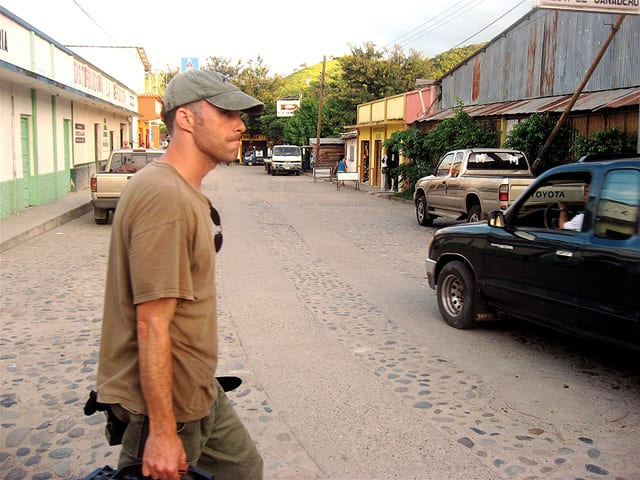In his junior year in high school, professor and filmmaker Boaz Dvir was voted editor of the school newspaper, but his adviser had to pull him aside and make a deal with him not to do it.
“I was going to be too much of a hard-hitting journalist,” Dvir says. Dvir’s high school newspaper adviser handcuffed him from doing any investigative work. “I was going to do too much investigative work and turn things upside down and she felt it was a bit much.”
Dvir’s investigative mind didn’t stay handcuffed for long.His journalism career took on a side that required him to be more investigative, with no boundaries. Now he’s renowned as a filmmaker all over the world. Dvir, an Israeli-born American, came to the United States as teenager from a small village. Speaking no English, he experienced a huge cultural shock in Westfield, New Jersey.
“I am someone who loves to engage in conversations and loves to listen to people and I couldn’t do it at the time.” Dvir learned English within a year through watching a lot of TV, proudly keeping his thick Israeli accent and, of course, falling in love with writing and filmmaking.
“As a kid, I was always adventurous and enjoyed a social life,” Dvir says. He never thought too much about what he wanted to do. He knew two things: He loved reading newspapers and loved writing. Dvir applied to only one school, the University of Florida,and studied journalism there.
After 15 years as a print journalist, Dvir was studying documentary filmmaking at grad school and teaching at the same university,when he stumbled upon his first film opportunity: Jessie’s Dad,a documentary about a father’s activism to boost child protection laws in this country. Jessie’s Dad gained admiration on campus at Florida in 2008 and later all over the country with official wide release in 2011. The rough cuts of the film helped push Jessica’s Law around the country and helped change the landscape for child protection. Forty-six states have passed the law.
Mostly self-taught and initially with no formula or plan in mind, Dvir was surprised at his first film’s national impact. “I am always critical
of my work,” he says. “I was very surprised at how much people liked it.”
Today, in his multimedia classes at Penn State, Dvir assigns his first film to his students to show them something he did when he had
similar skills.
Finding subjects and figuring out the themes are important in filmmaking. Dvir later realized a pattern – that he’s drawn to ordinary
people, who under extraordinary circumstances transform and become trailblazers and game changers – even superheroes in some cases. Jessie’s dad, Mark Lunsford, was a high school dropout who drove a truck and decided to change the landscape for child protection after the 2005 murder of his 9-year-old daughter by a convicted child molester.
Similarly, with a total of eight documentaries so far, Dvir continues to make big documentaries such as A Wing and a Prayer, Discovering Gloria, and Cojot, as well as other small ones to show ordinary people’s extraordinary transformations. For instance, a five-minute film Dvir directed and produced, PALS, about two teenage sisters helping students cope with depression, helped the organization they created earn an official nomination for a Nobel Peace Prize and a $100,000 grant.
“In terms of audience reaction, I have seen people dance and sing, laugh and cry in joy, and hug me during the rough screenings
of Discovering Gloria,” Dvir says of his film about another hero, a teacher, that is set to be released later this year.
Dvir continues to spread the word about his documentaries with rough screenings all over the country. On April 12, Dvir screened the
rough cut of his soon to be released documentary, Cojot, at the Penn State campus with actor Judd Nelson, star of the The Breakfast Club, who will narrate the final version of the film. Cojot profiles a Holocaust survivor who set out to kill his father’s Nazi executioner but
wound up playing a key role in the Entebbe hostage-rescue operation. Dvir expected at least 150 people for the big room at the Forum
building, but the crowd was more than twice that. “I was humbled by the turnout,” he says. “It was a packed house with about 350 people – from students to professors to local community members – all there to give me feedback on how to turn a really rough rough-cut into a strong film.”
His other screenings will take place May 2 in Baltimore, May 18 at the University of Florida in Gainesville, and early June in Philadelphia.
“Documentary filmmaking has allowed nonfiction storytellers to provide a vital perspective and explain our complex world at a
deep, critical level,” Dvir says. Although his films take years to complete. Dvir maintains a newspaper-deadline mindset
on a daily basis.
“If I had to describe my filmmaking mindset in one phrase, I would say that I have a constant sense of urgency,” Dvir says. “Documentary filmmaking is a long process and this is the best way I know to get things done.”
To learn more about Boaz Dvir’s film Cojot, go to facebook.com/cojot.



